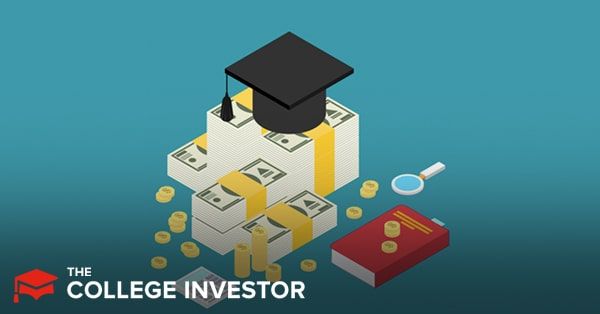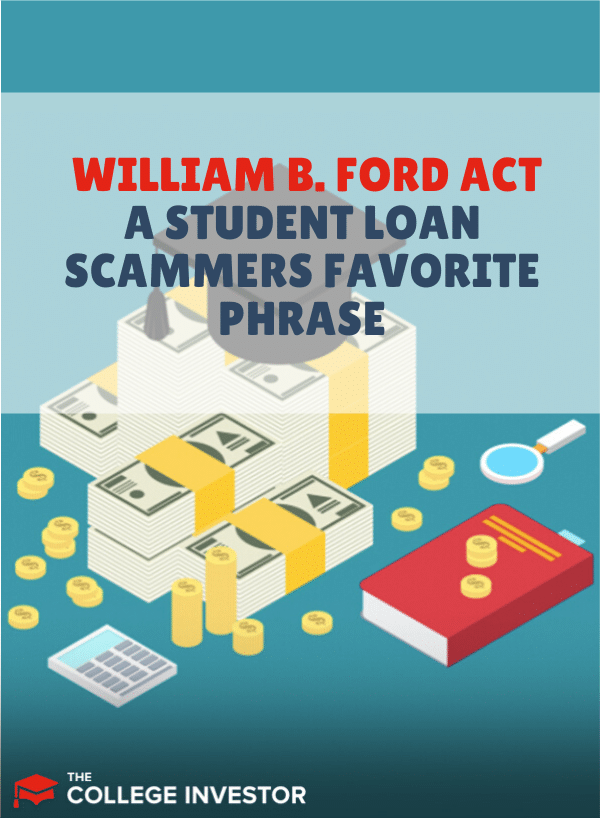
If you've heard the phrase: William D. Ford student loan forgiveness... run! While the William D. Ford student loan program is real, many scams use this phrase to hook victims.
Student loan repayment can be a byzantine mess for all 45 million student loan borrowers in the United States. And the confusing web offers scammers a gold mine to trick borrowers out of their hard-earned money.
Posing as legitimate government workers, student loan scammers will use official sounding phrases to lure unsuspecting individuals into their traps. Phrases like “aligned with the Department of Education” or “under the William D. Ford Act” dominate the scamming landscape.
Despite the fancy sounding titles or official sound programs, scam companies are out to make a quick buck without providing any value in return. In this article we explain how to spot an “official” sounding scam, and what to do to protect yourself from scammers.
What Are Student Loan Scams?
Student loan scams often involve individuals or companies who make false promises of fast debt relief when you pay large upfront fees to the company. In 2017, the Federal Trade Commission estimated that scammers collected nearly $100 million in fees by using deceptive practices.
Many scammers act under the guise of credit repair companies or pretend to be affiliated with the Department of Education. They may use illegal telemarketing campaigns to attract borrowers willing to pay for debt relief. A few popular student loan scams include:
- Disputing debt scams: Under this scam, a company claims that it can wipe out your debt in exchange for an upfront payment. The company says it will dispute your debt through a lawsuit or through another means. In some cases, you may, in fact qualify, for loan forgiveness. But a company cannot promise to get rid of your student loan debt in this way.
- Promises of fast forgiveness: Scammers may convince you that loan forgiveness is just a few payments away. Most of the time, a full discharge of your loans takes at least 20 years. If you work in the public sector or for a non-profit you may qualify for loan forgiveness in 10 years.
- Advance fee scams: Scammers often take an upfront fee in exchange for “negotiating” a lower payment or a lower interest rate. However, legitimate financial professionals can only charge a fee after they’ve provided a service to you.
Related: What To Do If You've Been Scammed By A Student Loan Company
Why Scammers Love To Use The Phrase “William D. Ford Act”
Scammers want to establish an air of legitimacy to gain your confidence as quickly as possible. This is why they often use official-sounding phrases such as William D. Ford Act.
There is actually no such thing as the "William D. Ford Act." Instead, the William D. Ford Federal Direct Loan Program is a loan program that was established by the Student Loan Reform Act of 1993. It provides low-interest loans directly to students who use them to study. If you have a federal student loan, it's probably a part of the William D. Ford Direct loan program.
Basically, the William D. Ford Act is simply the name of the law that allows for student loans.
Student loan borrowers who owe money under the Direct Loan Program are entitled to a variety of benefits including options for Public Service Loan Forgiveness, access to income driven repayment plans, and loan discharge after 20 to 30 years of loan payments. Unfortunately, the myriad of programs can make student loan repayment confusing ans scammers can prey on that confusion.
Red Flags That You May Be Caught In A Student Loan Scam
To avoid getting caught in a scam, it’s important to know the red flags. Here are a few signs that the company you're dealing with may not be legitimate.
Promises Of Quick Loan Forgiveness
Even if you qualify for one of the various loan forgiveness programs, most borrowers will still need to spend 5 to 20 years in repayment before they'll be eligible for loan cancellation.
Loan repayment plans must be personalized to your specific situation. Anyone who promises loan forgiveness without knowing your loan details, employment history, and income is probably just out to get your money.
Furthermore, nobody can guarantee forgiveness. It's takes years of qualifying payments. You can start the process, but you can't guarantee the result.
Discussions Of Loan Settlement
Loan settlement companies generally stop paying your loans to try to gain leverage in negotiations with your creditors. While this can work for some forms of debt, it doesn't work with federal student loans.
If you cannot handle the standard repayment plan on your debt, you can switch to an Income-Driven Repayment (IDR) plan. After 20-25 years of repayment, you'll qualify for loan forgiveness.
Promises To File A Lawsuit On Your Behalf
In general, student loans cannot be discharged through the court system. Disputing loans or filing lawsuits against lenders is more likely to result in excessive lawyers fees and limited results.
Requiring Upfront Payment Of Fees
You should never pay an upfront fee to consolidate a debt or otherwise receive help with a debt. Upfront fees, especially in relation to student debt relief, are a major red flag.
Requests For Your FSA ID
Your Federal Student Aid ID is very sensitive information and you do not need to give it out to anyone. Report anyone who requests your FSA ID to the Consumer Federal Protection Bureau and do not do business with them.
On a related note, be wary of anyone claiming to be affiliated with the US Department of Education, your loan servicer, or the William D. Ford Act. If they are acting fishy, hang up the phone, and reach out to your loan servicer for more information.
Steps To Take Before You Work With An Outside Party
Not sure whether someone you're talking to is trying to scam you? Before working with an outside party, consider taking these steps.
Learn About Your Options From The Department of Education
You don't need a company to tell you about your "William D. Ford Act" rights and benefits. You can learn about all your repayment options from the “In Repayment” tab on StudentAid.gov. This is an official Department of Education website that can give you all the information you need to get started.
Utilize Free Resources
Free resources such as blogs (like ours and these other amazing student loan blogs), podcasts, or a tool can help you learn more about your options at no cost to you.
Reputable third parties can help you distill information so you can make informed decisions on your own.
Never Pay For A Service You Don’t Understand
In some cases, you may decide that it’s worth your money to pay for a third party to help you. But before you open your wallet, take time to understand what the third party provides to you.
- Will they help you make a decision about the best repayment options?
- Will they help you submit and organize paperwork?
- Will they provide guidance on loan repayment and it’s tax consequences for you?
- Are they a financial planner or fiduciary what will help with your entire financial plan?
All of these are valuable services, but you need to understand them before you pay.
Don’t Pay To Consolidate Your Loans
Some companies offer to consolidate your student loans in exchange for compensation.
This isn’t a scam, but it is also something you can do on your own through StudentLoans.gov FOR FREE!
Related: This Is Everything You Need To Know About Student Loan Consolidation
Final Thoughts
Student loan borrowers who need personalized help should not rely on spammy ads, telemarketing calls, or companies looking to make a quick buck. And if a company representative keeps throwing around the phrase "William D. Ford Act," there's a good chance they belong to this category.
If you need personalized help, look for reputable sources such as financial planners or lawyers who specialize in student loan debt and will work through your personal circumstances.
We recommend The Student Loan Planner to help you put together a comprehensive financial plan for your student loan debt.
Remember, you can do it all yourself, you can use tools, you can pay for help - but don't fall for scams!

Robert Farrington is America’s Millennial Money Expert® and America’s Student Loan Debt Expert™, and the founder of The College Investor, a personal finance site dedicated to helping millennials escape student loan debt to start investing and building wealth for the future. You can learn more about him on the About Page or on his personal site RobertFarrington.com.
He regularly writes about investing, student loan debt, and general personal finance topics geared toward anyone wanting to earn more, get out of debt, and start building wealth for the future.
He has been quoted in major publications, including the New York Times, Wall Street Journal, Washington Post, ABC, NBC, Today, and more. He is also a regular contributor to Forbes.
Editor: Clint Proctor Reviewed by: Ashley Barnett
